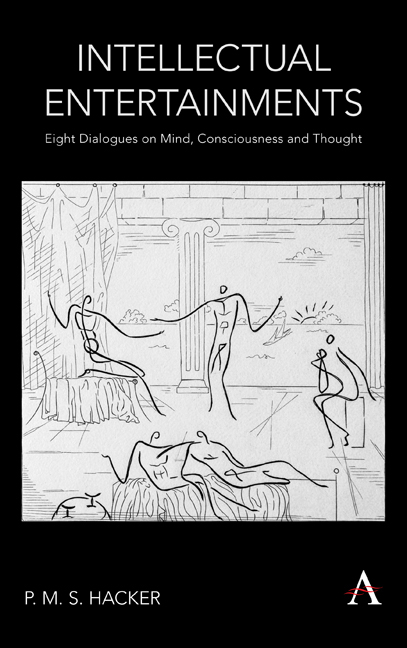Book contents
- Frontmatter
- Dedication
- Contents
- Preface
- Acknowledgements
- Section 1 Two Dialogues on Mind and Body
- Section 2 Two Dialogues on Consciousness
- Section 3 A Dialogue on the Objectivity or Subjectivity of Perceptual Qualities
- Introduction
- Fifth Dialogue On the Objectivity or Subjectivity of Perceptual
- Section 4 Two Dialogues on Thought
- Section 5 A Dialogue on Ownership of Pain
Introduction
from Section 3 - A Dialogue on the Objectivity or Subjectivity of Perceptual Qualities
Published online by Cambridge University Press: 06 December 2019
- Frontmatter
- Dedication
- Contents
- Preface
- Acknowledgements
- Section 1 Two Dialogues on Mind and Body
- Section 2 Two Dialogues on Consciousness
- Section 3 A Dialogue on the Objectivity or Subjectivity of Perceptual Qualities
- Introduction
- Fifth Dialogue On the Objectivity or Subjectivity of Perceptual
- Section 4 Two Dialogues on Thought
- Section 5 A Dialogue on Ownership of Pain
Summary
The thought that colours, sounds, smells, tastes, heat and cold, wetness and dryness, and so forth are essentially subjective and relative was advanced by Galileo in the seventeenth century. These so-called secondary qualities were, he suggested, inessential to the notion of a material body. They play no role in a properly scientific account of the material world, and, by contrast with primary qualities such as shape, solidity, size and weight they are causally impotent. In fact, they are more akin to pains and tickles than to shape or motion. Nature in itself is colourless, soundless, tasteless and odourless, neither hot nor cold, neither wet nor dry. Secondary qualities are produced in our minds as a result of the impact of bodies or waves upon our sensitive organs, just as pains are produced by cutting our flesh. They are essentially subjective. Remove sentient creatures from the world, and all is dark. Thunderstorms produce no noise – unless there are ears to hear, and trees on desert islands fall soundlessly to the ground – unless there is a Robinson Crusoe to listen.
This conception won the allegiance of the advanced scientists of the day including Boyle and Newton. In our times, it is the received view of most psychologists, cognitive neuroscientists and physicists. Many consider this conception to be a deliverance of science, resting firmly on empirical evidence. But to be sure, there is no experiment to prove that grass is not green or that roses are colourless. The claim that the so-called external world is, in itself, colourless is a piece of seventeenth-century metaphysics, not of twenty-firstcentury science. Although this conception is now conventional wisdom, and indeed is taught to schoolchildren as such, we have lost the sense of shock and wonder at it. For, of course, if it is true, we live in a world of illusion – nothing is really, in and of itself, coloured; there aren't really any sounds at all – the music is all in our minds or brains. Lilac and jasmine do not really have a scent – unless they are smelled. Fire may, to be sure, have a temperature, but it is not really hot, and ice is frozen water, but it is not really cold.
- Type
- Chapter
- Information
- Intellectual EntertainmentsEight Dialogues on Mind, Consciousness and Thought, pp. 111 - 112Publisher: Anthem PressPrint publication year: 2019



